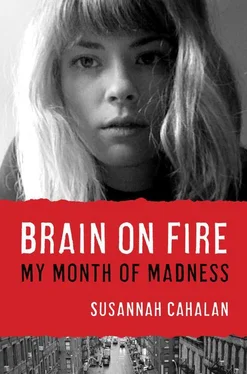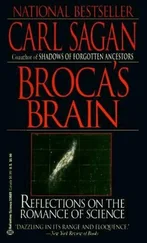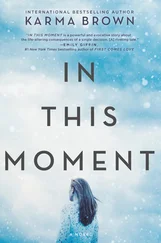Afterward we piled into Sheila’s car so she could drive us back to Stephen’s apartment in Jersey City. The three of them talked about how incredible the band had been, but I stayed silent. My shyness struck Stephen as strange; I was never one to keep my opinions to myself.
“Did you like the show?” Stephen nudged, reaching out for my hand.
“I can’t really remember it.”
After that weekend, I took three more consecutive days off work. That was a lot for anyone, but especially for a newbie reporter. Even when the Post kept me out past 4:00 a.m. working on Meatpacking District club stories, I always made it to the office right on time a few hours later. I never took sick days.
I decided to finally share my diagnosis with my mother, who was distressed when I told her about the numbness, particularly because it was only on one side of the body. I assured her it was only because of the mono. My father seemed less concerned on the phone, but on my third day off he insisted on coming into Manhattan to see me. We met at an empty AMC Theater in Times Square for an early showing of The Wrestler .
“I used to try to forget about you,” Randy “the Ram,” a washed-up pro wrestler played by a haggard Mickey Rourke, says to his daughter. 3“I used to try to pretend that you didn’t exist, but I can’t. You’re my little girl. And now I’m an old broken-down piece of meat and I’m alone. And I deserve to be all alone. I just don’t want you to hate me.” Hot, wet tears ran down my cheeks. Embarrassed, I tried to control the heaving in my chest, but the exertion made me feel worse. Without saying a word to my father, I ran from my seat to the theater’s bathroom, where I hid in a locked stall and allowed myself to weep until the feeling passed. After a moment, I collected myself and headed out to wash my hands and face, ignoring the concerned rubbernecking of the middle-aged blond at a nearby sink. When she left, I stared at my image in the mirror. Was Mickey Rourke really getting to me? Or was it the whole father-daughter thing? My dad was far from affectionate, habitually avoiding using words like “I love you,” even with his children. It was a learned deficiency. The one time he had kissed his own father was when my grandfather was on his deathbed. And now he was taking time out of his busy schedule to sit beside me in an empty theater. So, yeah, it was unsettling.
Get yourself together, I mouthed. You’re acting ridiculous.
I rejoined my father, who didn’t seem to have noticed my emotional outburst, and sat through the remaining portion of the movie without another breakdown. After the closing credits, my father insisted on walking me to my apartment, offering to check it out because of the bedbug scare, though it was clear he was mainly concerned about my health and wanted to spend more time with me.
“So they say you have mono, huh?” he asked. Unlike my mother, who reviewed New York magazine’s list of best doctors religiously, my father had always distrusted medical authority. I nodded and shrugged my shoulders.
When we got near my apartment, however, my stomach filled with that inexplicable but now-familiar dread. I suddenly realized that I didn’t want him to come inside. Like most fathers, he had chastised me when I was a teenager about allowing my room to get filthy, so I was used to that. But today I felt ashamed, as if the room was a metaphor for my screwed-up life. I dreaded the idea of his seeing how I was living.
“What the hell is that smell?” he said as I unlocked the door.
Shit. I grabbed a plastic Duane Reade bag by the door. “I forgot to throw out the kitty litter.”
“Susannah. You’ve got to get yourself together. You can’t live like this. You’re an adult.”
We both stood in the doorway, looking at my studio. He was right: it was squalid. Dirty clothes littered the floor. The trash can was overflowing. And the black garbage bags, which I’d packed during the bedbug scare and before the exterminator had come to spray three weeks earlier, still covered the room. No bedbugs were found, and no more bites had surfaced. By now I was convinced it was over—and a small part of me had begun to wonder if they had ever been there at all.
Ireturned to work the next day, a Thursday, which gave me just enough time to finish up a story and pitch two more. Neither passed muster.
“Please do LexisNexis searches first,” Steve wrote, responding to my new pitches.
Insecurity is part of the job, I told myself. Reporters exist in a state of constant self-doubt: sometimes we have disastrous weeks when stories don’t pan out or sources clam up; other times we have killer ones, when even the seemingly impossible works out in our favor. There are times when you feel like the best in the business, and other times when you’re certain that you’re a complete and total hack and should start looking for an office job. But in the end, the ups and downs even out. So why was everything in such upheaval for me? It had been weeks since I felt comfortable in my own journalist skin, and that frightened me.
Frustrated by my sloppy performance, I asked to go home early, again, hoping it was just the mono. Maybe a good night’s sleep would finally get me back to my usual self.
That night I tossed and turned, filled with misgivings about my life. When my alarm clock rang the next morning, I hit the snooze button and decided to call in sick again. After a few more hours of sleep, I woke up rested and calm, as if the whole mono thing had been a distant nightmare. The weekend now loomed brightly on the horizon. I phoned Stephen.
“Let’s go to Vermont.” It was a statement, not a question. Weeks earlier we had had plans to go to Vermont and stay at my stepbrother’s house, but since I had gotten sick, the trip had been postponed indefinitely. Sensing that I still wasn’t my old self, Stephen was offering reasons that we shouldn’t rush into the trip when a blocked call beeped in on the other line. It was Dr. Rothstein.
“The blood test results came back. You are not positive for mononucleosis,” he said. “How are you feeling?”
“So much better.”
“Okay, then, it must have been some garden-variety virus that’s now out of your system.”
Invigorated, I called Stephen back, insisting that we pack our bags and go away for the weekend. He caved. That afternoon we borrowed my mom’s black Subaru and drove four hours north to Arlington, Vermont. It was a perfect weekend: Saturday and Sunday mornings we went to a quaint local restaurant called Up For Breakfast, shopped at outlet malls, and hit the slopes—or, rather, Stephen snowboarded as I read Great Expectations in the lodge. On Sunday a snowstorm hit, so we were happily forced to stay another day, which meant more time off from work. Finally I agreed to ski, and Stephen led me to the top of a small mountain.
I had skied a few times before and never found the intermediate slopes difficult to manage, though I was hardly an expert. But this time, as the wind whipped my face and the snowflakes burned my cheeks, the mountain suddenly seemed far steeper than ever before. It loomed out below me, long, narrow, and threatening. I felt instantly helpless, and I panicked, a kind of deep-seated fight-or-flight fear that I had read about but never experienced.
“Ready?” Stephen’s voice sounded distant in the howling winds. My heart pounded in my ears, as I raced through ever-more-terrible scenarios: What if I never make it down? What if Stephen leaves me here? What if they never find my body?
Читать дальше













